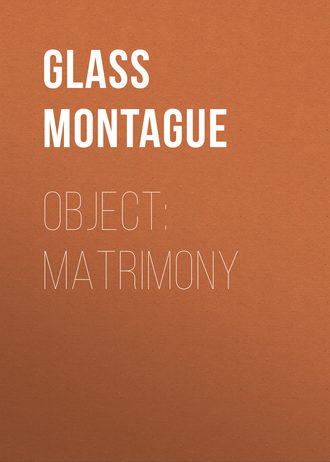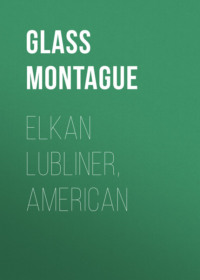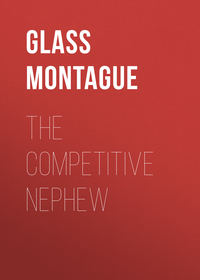 полная версия
полная версияObject: matrimony
"Send that soup to the kitchen," he said, "and tell 'em to serve it hot when we come back."
Two hours later they reappeared at the same table, and the grinning waiter immediately went off to the kitchen. When he returned he bore a glass bowl containing a napkin elaborately folded in the shape of a flower, and inside the napkin was a little heap of rice.
V
There was something about Mr. Elkan Goldblatt's face that would make the most hardy real-estater pause before entering into a business deal with him. He had an eye like a poll-parrot with its concomitant beak, and his closely cropped beard and moustache accentuated rather than mollified his harsh appearance.
"Such fellers I wouldn't have no more mercy on than a dawg," he said to his attorney, Eleazer Levy. "Oncet already I practically kicked him out from my house, and then he's got the nerve to come back, and two weeks ago he brings yet a feller with him and makes bluffs that the feller wants to marry my daughter Fannie."
"He was just trying to get you to extend those second mortgages, I suppose," Levy said.
"Sure he was, because this here feller – a homely looking feller with one eye, mind you – says he got to go back to Pennsylvania where his stores is, and we ain't seen nor heard a word from him since," Goldblatt concluded. "And him eating two meals a day by us for ten days yet!"
Eleazer Levy clucked with his tongue in sympathy.
"But, anyhow, now I want we should go right straight ahead and foreclose on Margolius," Goldblatt continued. "Don't lose no time, Levy, and get out the papers to-day. How long would it be before we can sell the property?"
"Six weeks," said Levy, "if I serve the summons to-morrow. I put in a search some days ago, and the feller ain't got a judgment against him."
"So much the better," Goldblatt commented. "The property won't bring the amount of the first mortgage and I suppose I got to buy it in. Then I will get deficiency judgments against that feller, and I'll make him sorry he ever tried any monkey business with me and my daughters. Why, that feller actually turned my own children against me, Levy."
"Is that so?" Levy murmured.
"My Birdie abused me, I assure you, like I was a pickpocket when I says I would foreclose on him," Goldblatt replied. "And even my Fannie, although she is all broke up about that one-eyed feller, she says I should give the young feller a show. What d'ye think of that, hey?"
"Terrible!" Levy replied. "A feller like that deserves all he gets, and you can bet yer sweet life he won't have any let-up from me, Mr. Goldblatt."
Levy was as good as his word, for that very afternoon he filed a notice of pendency of action against the Heidenfeld Avenue property, and the next morning, as Philip left his house, a clerk from Levy's office served him with four copies of the summons and complaint in the foreclosure suit of Goldblatt vs. Margolius, actions numbers 1, 2, 3 and 4. But Philip stuffed them into his pocket unread; he had other and more poignant woes than foreclosure suits. Only ten days wed, and he was denied even the sight of his wife longer than five minutes; for she was not endangering future prospects in favour of present happiness.
"We could, anyway, get the furniture out of him," she argued when she saw Philip that day, "and, maybe, a couple of thousand dollars."
"I don't care a pinch of snuff for his furniture," Philip cried. "I will buy the furniture myself."
"But I can't leave Fannie just now," she declared; "she's all broke up about that feller."
"What about me?" Philip protested. "Ain't I broke up, too?"
"So long you waited, you could wait a little longer yet," she replied; "but poor Fannie, you got no idea how that girl takes on."
"She shouldn't worry," Philip cried. "I promised I would fix her up, and I will fix her up."
Daily the same scene was enacted at the Goldblatt residence on One Hundred and Eighteenth Street, and daily Birdie refused to forsake her sister, until six weeks had elapsed.
"But, Birdie," Philip announced for the hundredth time, "so sure as you stand there I couldn't keep this up no longer. I will either go crazy or either I will jump in the river."
Birdie patted him on the back.
"Don't think about it," she said. "Take your mind off it. To-day your property gets sold and Popper says he will be down at the salesroom at twelve o'clock."
"Let 'em sell it," Philip cried; "I don't care."
He turned away after a hurried embrace, and was proceeding down Lenox Avenue toward the subway when Marks Henochstein, the real-estate broker, encountered him. Marks clutched him by the shoulder.
"Well, Philip," Henochstein cried, "you are in luck at last."
"In luck!" Philip exclaimed bitterly. "A dawg shouldn't have the luck what I got it."
"Well, if you don't call it lucky," Henochstein continued, "what would you call it lucky?"
"Excuse me, Henochstein," said Philip; "I ain't good at guessing puzzles. What am I lucky for?"
"Why, ain't you heard it yet?"
"I ain't heard nothing," Philip replied. "Do me the favour and don't keep me on suspension."
"Why, the city is going to widen Two Hundred and Sixty-fourth Street in front of them houses of yours, and you will get damages. Oi! what damages you will get!"
Philip stared blankly at his informant for one hesitating moment; then he dashed off for the nearest subway station.
Half an hour later he sat in the office of Henry D. Feldman and gasped out his story.
"In three quarters of an hour, Mr. Feldman," he cried, "that property will be sold, and, if it is, the feller what buys it will get damages for the street opening and I will get nix."
"This is a fine time to tell me about it, Margolius," Feldman said. "You came in here six weeks ago and asked me to help you out, and I haven't seen you since. The time to do something was six weeks ago. Why didn't you come back to see me before the suit was started?"
"Because I was busy, Mr. Feldman," Margolius replied. "A whole lot of things happened to me about that time. In the first place, the next day after I saw you I got married."
"What!" Feldman exclaimed, "you got married? Well, Margolius, you recovered pretty quickly from that affair with Birdie Goldblatt."
Margolius stared gloomily at his attorney.
"What d'ye mean I recover from it?" he echoed. "I didn't recover from it, Mr. Feldman. That's who I married – Miss Birdie Goldblatt."
Feldman sat back in his chair.
"Well, of all the unfatherly brutes," he said, "to shut down on his own daughter's husband!"
"Hold on there, Mr. Feldman," Philip interrupted; "he don't know he's shutting down on his daughter's husband, because we was secretly married, y' understand? And even to-day yet the old man don't know nothing about it."
"What do you mean?" Feldman asked. "Why wouldn't he know his own daughter was married?"
"Because she's living home yet," Philip replied, and "I can't persuade her to go housekeeping, neither."
Feldman frowned for a moment and then he struck the desk with his fist.
"By jiminy!" he shouted, "you've got the old man by the whiskers!"
It was now Philip's turn to ask what Feldman meant.
"Why," the latter explained, "your wife's inchoate right of dower is still outstanding."
"That's where you make a big mistake, Mr. Feldman," Philip corrected. "My Birdie is a neat dresser and never so much as a pin out of place."
"You don't understand," Feldman continued. "As soon as Birdie and you got married she took an interest in your property."
"Sure she took an interest in my property," Philip assented. "Why, if it wouldn't be for her I wouldn't know nothing about this here sale to-day."
"But I mean that as soon as she married you she became vested with the right to receive the rents of a third of that property during her lifetime as soon as you died," said Feldman.
"Well, we won't worry about that," Philip said with a deprecatory wave of his hand, "because, in the first place, that property is pretty near vacant and don't bring in enough rents to pay the taxes, and, in the second place, I'm still good and healthy and I wouldn't die for a long time yet."
"Oh, what's the use!" Feldman cried. "What I mean is that they can't foreclose those second mortgages unless they make Birdie a party to the suit and serve her with the summons; so, all you have to do to stop the sale is to go down to the salesroom and, when the auctioneer starts to ask for bids, get up and tell 'em all about it. Why, they'll have to begin their suit all over again."
"But," Philip protested, "if I tell 'em all about it the old man will throw Birdie out of the house."
"Hold on!" Feldman broke in. "You mustn't tell them you're married to Birdie. Just tell them you're married, and let them find out your wife's name for themselves. Although, to be sure, that won't take long, for the record of marriage licenses at the city hall will show it."
"License nothing!" Philip cried. "We didn't get no license at the city hall. We got married by a justice of the peace in Jersey City."
"Fine!" Feldman exclaimed, his professional ethics thrown to the winds. "That'll keep 'em guessing as long as you want."
"All I want is a month, and by that time I can raise the money and fix the whole thing up," Margolius replied.
Feldman looked at his watch.
"Chase yourself," he said; "it's a quarter of twelve, and the foreclosure sale begins at noon."
VI
On the rostrum of an auctioneer in the Vesey Street salesroom stood Eleazer Levy in weighty conversation with Miles M. Scully, the referee in foreclosure. Scully's brow was furrowed into a thousand earned wrinkles, and the little knot of real-estate brokers who regularly attend foreclosure sales gazed reverently on the two advocates.
"And here was this guy," Levy concluded, "with nothing but a pair of sixes all the time."
"But in a table-stakes game," Scully murmured, "you make a sight more if you don't butt into every pot. If you think you're topped lay 'em down. That's what I do, and it pays."
They were waiting for the auctioneer to appear, and Goldblatt hung around the edge of the crowd and gazed anxiously at them. He had heard that morning of the proposed street widening and wanted the sale to go through without a hitch. At length the auctioneer arrived and the clerk read off the notice of sale in a monotonous gabble just as Philip elbowed his way through the crowd.
"Now, then, gentlemen," the auctioneer announced pompously, "the four parcels will be sold separately. Each is subject to a first mortgage of twenty thousand dollars and is otherwise free and clear except the taxes. The amount of taxes is – "
"Hey, there!" Philip cried at this juncture. "I got something to say, too."
The auctioneer paused and fixed Philip with what was intended to be a withering look.
"Put that man out!" the auctioneer called to one of the attendants.
"You could put me out," Philip yelled, "if you want to, but you couldn't put my wife out, because she ain't been served with the summons and complaint in the first place, and she ain't here in the second place."
Goldblatt turned pale and started for the rostrum, while the auctioneer motioned the attendant to hold off for a minute.
"Is he a married man?" the auctioneer asked Levy.
"He's a faker," Levy replied. "Go ahead with the sale."
"Am I a faker?" Philip yelled, holding up his left hand. "Well, look at that there ring."
He pulled it off with an effort and handed it to the auctioneer.
"Look inside," he said. And, sure enough, the inner side bore the inscription: "B. G. to P. M., 10-20-'09." Goldblatt looked at it, too; but B. G. meant nothing to him and he handed it back to the auctioneer.
"That's only a scheme what he's trying to work it," he said. "Give him back the ring and go ahead with the sale."
"One moment," said Miles M. Scully. "I'm the referee here, and I ain't going to take no such chance as that. I'm going to adjoin this here sale one week and investigate what this here guy says in the meantime."
Forthwith, the auctioneer announced a week's adjournment of the four sales, and Philip resumed his wedding ring with a parting diabolical grin at Goldblatt, and left the auction-room. He went to the nearest telephone pay station and rang up the Goldblatt residence, but for over half an hour he received only Central's assurance that as soon as there was an answer she would call him.
"But, Central," he protested, "there's got to be somebody there. They can't all be out."
And Philip was right. There were two people sitting in the front parlour of the Goldblatt residence, and another and more interested person stooped in the back parlour, with her ear to the crack of the sliding doors which divided the two rooms. The telephone bell trilled impatiently at brief intervals, but all three were oblivious to its appeal; for the two persons in the front parlour were engaged in conversation of an earnest character, and the person in the rear room would not have missed a word of it for all the telephones in the world.
"Yes, Fannie," said one of the two persons, "I come back to you, anyhow, and I come back for good."
He placed his arms around her ample waist.
"I assure you, Fannie," he concluded, "them dollar-a-day American-plan hotels in the northern-tier counties is nothing but poison to a feller. I am pretty near starved."
"Why didn't you say so at first?" Fannie replied, rising from the couch where she had been sitting with Feigenbaum. "I got some fine gefüllte Fische in the ice-box."
Whereupon Birdie answered the 'phone.
"Hallo!" came a voice from the other end of the wire. "Where was you all the time? I got some good news for you."
"I've got some good news for you, too," Birdie replied. "Fannie and Mr. Feigenbaum are engaged."
VII
Elkan Goldblatt usually arrived home at seven o'clock to find his dinner smoking on the table. His daughter Fannie always attended to the carving, but on the night of the foreclosure sale it was Birdie who presided at the head of the board.
"Where's Fannie?" he asked.
"She went out to dinner," Birdie explained.
Elkan nodded and lapsed into gloomy silence.
"What's the matter now?" Birdie inquired.
"That lowlife Margolius," he said, "what do you think from that loafer? He goes to work and gets married."
Birdie gasped and turned white, all of which her father mistook for symptoms of astonishment.
"Ain't that a loafer for you?" he continued. "All the time he hangs around here, and then he goes to work and gets married."
"Who did he marry?" Birdie asked innocently.
"A question!" Goldblatt exclaimed. "Who can tell it who a lowlife like him would marry?"
Birdie tossed her head.
"He ain't no lowlife just because he gets married," she retorted. "What's more, any girl would be glad to get a good-looking, decent young feller like Philip Margolius."
Goldblatt laid down his knife and fork.
"You are crazy in the head," he said. "Why should you stick up for a young feller what comes around here and upsets my whole house? You I don't care about, because you could always get a husband; but Fannie – that's different again. It ain't enough for that loafer that he disappointed her himself, but he also got to bring around here that one-eyed feller – another such lowlife as Margolius – and he also disappoints Fannie. That feller Margolius is a dawg, Birdie, believe me."
Birdie rose from her seat and threw her napkin on to the floor.
"I won't sit here and listen to such talk," she cried and ran out of the room. For a moment Goldblatt essayed to finish his dinner, and then he, too, rose and followed Birdie. He found her weeping on the parlour lounge.
"Birdie!" he cried. "Birdiechen, what are you taking on so for?"
"I won't have you say such things about Ph-Ph – Feigenbaum," she sobbed.
"Why not?" he asked.
"Because Mr. Feigenbaum came here this afternoon and proposed to Fannie," she explained to her father, "and they're downtown now getting the ring from a friend of his what keeps a jewellery store on Grand Street."
Goldblatt sat down heavily on the lounge and wiped his forehead. For ten minutes he sat motionless in the shrouded gloom of that front parlour before he could realize his daughter's good fortune.
"After all," he said finally, "when a feller's got six stores you could easy excuse him one eye."
"You ought to be ashamed to talk that way," Birdie cried. "Mr. Feigenbaum is a decent business man, and if it wouldn't be for Philip – Philip Margolius – Fannie would of lived and died an old maid."
At this juncture came a ring at the bell and the sound of voices in the hall. It was Fannie and her fiancé, who had returned from Grand Street, and the next moment Goldblatt clasped his affianced daughter in his arms and bestowed on her great kisses that fairly resounded down the block. Next he grabbed Feigenbaum's hand and shook it up and down.
"The happiest day what I ever lived," he cried, slapping his new son-in-law on the back. For almost a quarter of an hour Fannie and Birdie mingled their tears with their father's embraces, and in the midst of the excitement the bell rang again. When the maid opened the street door some one inquired for Mr. Goldblatt in a barytone voice whose familiar timbre chilled into silence the joyful uproar.
"Margolius!" Goldblatt hissed. He started for the hall with blood in his eye, when Feigenbaum seized him by the arm.
"Mr. Goldblatt," he said, "for my sake don't make no fuss with Margolius. He's a friend of mine, and if it wouldn't be for him Fannie and me would never of met already."
As Philip entered the darkened front parlour there was a silence so profound that he believed the room to be empty.
"Excuse me," he cried when he recognized the assembled company. "I thought Mr. Goldblatt was alone."
He turned to his father-in-law.
"Mr. Goldblatt, could I speak to you for a minute by yourself?" he asked.
Goldblatt coughed impressively.
"Margolius," he announced, "if you got anything to say to me, say it right here. I ain't got no private business with you."
"All right," Philip replied cheerfully. "I come here to ask you how much would you take it for them second mortgages what you hold on my Two Hundred and Sixty-fourth Street property?"
Goldblatt waved his hand haughtily.
"You come to the wrong party, Margolius," he said. "Because I just made up my mind to something. I made up my mind that because Mr. Feigenbaum is engaged to my Fannie I will give her them mortgages as a marriage portion. So you should ask Feigenbaum that question, not me."
While Philip turned pale at this announcement, Feigenbaum grew positively crimson.
"Looky here, Goldblatt," he protested to his proposed father-in-law; "I don't want you should unload them second mortgages on me."
"What's the matter with you, Feigenbaum?" Goldblatt retorted. "Them second mortgages is as good as gold. Only thing is they got to be foreclosed against Margolius' wife."
"His wife!" Feigenbaum and Fannie cried with one voice, for Birdie had kept her secret well.
"Yes," Goldblatt replied, "his wife. That lowlife has got a wife. But who or what she is nobody don't know."
"Hold on, Goldblatt!" cried a voice from the hall. "There's somebody that does know."
The next moment a short, stout person entered the parlour. It was Eleazer Levy, who had rung the bell and had been admitted to the house unnoticed.
"Yes, Margolius," he said, "you thought you could fool an old practitioner like me. I seen you didn't get out no license in this county, so I hiked over to Jersey City and, sure enough, I spotted you."
He turned to Birdie.
"Mrs. Margolius," he said, "here's four copies of the supplemental summons and amended complaint in the foreclosure suits of Goldblatt vs. Margolius, actions numbers 1, 2, 3 and 4."
"What do you mean?" Goldblatt cried.
"I mean," Levy answered, "that your daughter Birdie married Philip Margolius in Jersey City on the twentieth of October last."
Elkan Goldblatt collapsed in the nearest chair, while Feigenbaum ran downstairs for the bottle of schnapps. At length Goldblatt was restored.
"So, Margolius," he croaked, "you are a thief, too. You steal my daughter on me?"
"That ain't here nor there," Margolius said with his arm around Birdie's waist and her head on his shoulder. "That ain't here nor there. How much will you take it now for a satisfaction piece of them mortgages?"
Goldblatt looked at Feigenbaum, who returned his glance unmoved.
"For a marriage portion," Feigenbaum declared, "second mortgages is nix."
There was an embarrassing silence, and finally Goldblatt cleared his throat.
"All right, Margolius," he said; "you married my Birdie, and I suppose I got to stand for it, so you can take them four second mortgages and keep 'em as a marriage portion yourself."
Birdie seized her father around the neck and kissed him on the ear.
"Then we are forgiven? Ain't it?" she cried.
"Sure you are forgiven," Goldblatt said. "Only, Margolius has got to pay Levy's costs and disbursements."
"And the referee's fees and the auctioneer's fees," Levy added.
"I am agreeable," Philip replied.
Levy turned and beamed a benediction on his client's reunited family. "I wish you all joy," he said.
THE END



